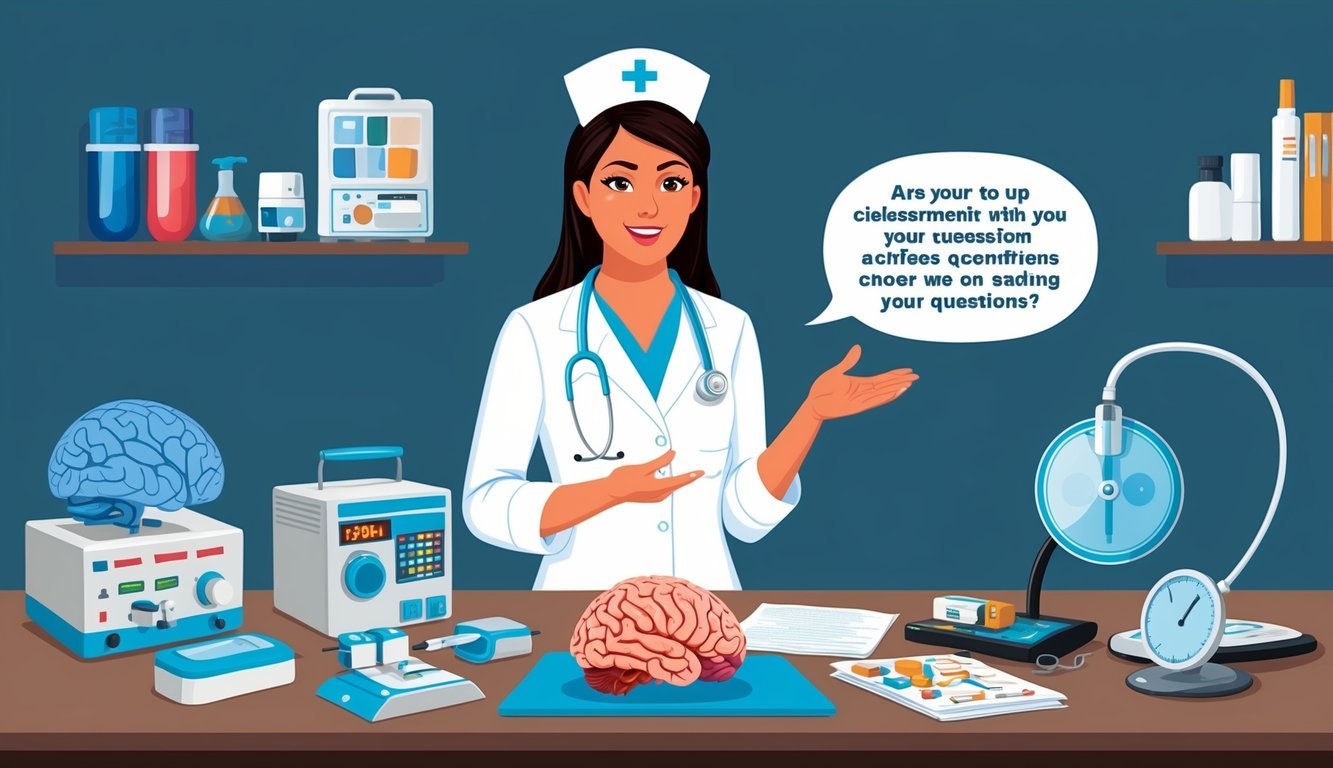Neuroscience nursing is a specialized field of nursing that focuses on patients with neurological injuries or illnesses.
As a neuroscience nurse, you will play a critical role in assessing, diagnosing, and implementing care plans for individuals facing complex challenges related to their nervous system.
This unique position requires a blend of strong clinical skills, compassion, and advanced education.
To succeed in this field, you need to pursue relevant educational pathways, such as earning a Bachelor of Science in Nursing (BSN).
Your responsibilities will include monitoring patients’ neurological status, administering medications, and providing essential support during recovery.
As you advance in your career, opportunities for professional development and networking will help enhance your skills and expand your impact on patient care.
Becoming a neuroscience nurse opens the door to a rewarding career in healthcare, where you can truly make a difference in people’s lives.
Understanding the various aspects of this profession can help you determine if this path aligns with your career goals.
Key Takeaways
- Becoming a neuroscience nurse requires a Bachelor of Science in Nursing (BSN).
- Your role includes crucial patient assessment and intervention strategies.
- Opportunities for growth and networking enhance your career in this specialized field.
Educational Pathways to Neuroscience Nursing
To pursue a career as a neuroscience nurse, you need to follow specific educational pathways.
Understanding the types of nursing degrees and the necessary licensing and certifications is essential for your success in this field.
Understanding Nursing Degrees: ADN and BSN
To become a neuroscience nurse, you can earn either an Associate Degree in Nursing (ADN) or a Bachelor of Science in Nursing (BSN).
-
ADN: This program typically takes 2-3 years to complete. It is often faster and may lead to entry-level nursing positions. However, many healthcare employers prefer candidates with a BSN due to the complexity of neuroscience nursing.
-
BSN: This degree usually takes 4 years to complete and provides a more comprehensive education. It covers essential topics such as health assessment, nursing research, and management skills. Holding a BSN can enhance your job opportunities and patient care skills.
Both degrees prepare you to take the NCLEX-RN exam, which is vital for licensing.
Licensing and Certifications: NCLEX-RN and CNRN
After completing your nursing degree, you must pass the NCLEX-RN (National Council Licensure Examination for Registered Nurses).
This exam evaluates your knowledge and skills necessary for safe nursing practice.
Once you become licensed, consider advanced certifications to enhance your expertise.
For example, the Certified Neuroscience Registered Nurse (CNRN) certification is offered by the American Board of Neuroscience Nursing.
- Benefits of CNRN: This certification shows your commitment to neuroscience nursing. It can help you stand out in job applications and may lead to higher salaries.
You can find more information about certification programs on the American Association of Neuroscience Nurses website.
Roles and Responsibilities

Neuroscience nurses play a crucial role in caring for patients with neurological conditions.
Their work includes general nursing duties as well as specialized interventions tailored to specific disorders.
Understanding these responsibilities can help you appreciate the complexity and importance of this field.
General Duties of a Neuroscience Nurse
As a neuroscience nurse, your primary responsibilities include assessing and monitoring patients with neurological issues.
You will frequently check their neurological status, which involves evaluating their cognitive functions, motor skills, and sensory responses.
Key general duties include:
- Administering medications: You will provide necessary medications and treatments as prescribed.
- Patient education: Teaching patients and families about their conditions and care plans is essential for effective recovery and management.
- Support for daily activities: Assisting patients in regaining independence through rehabilitation and daily living activities is often a key part of care.
Your role also involves collaborating with a multidisciplinary team, including neurologists and therapists, to develop comprehensive care plans for individuals recovering from conditions like stroke, epilepsy, and multiple sclerosis.
Specialized Care in Neurological Conditions
Neuroscience nurses specialize in caring for patients with various neurological conditions.
This specialty requires knowledge of specific diseases and their management.
Common conditions you may encounter include:
| Condition | Focus of Care |
|---|---|
| Stroke | Rapid assessment and intervention to minimize damage |
| Epilepsy | Monitoring seizures and medication adherence |
| Parkinson’s Disease | Supporting mobility and medication management |
| Multiple Sclerosis | Assisting with symptom management and rehabilitation |
| Meningitis | Providing intensive care and monitoring for infection |
You must stay informed about the latest treatment options and guidelines.
This knowledge enables you to provide optimal care and support for patients experiencing conditions like seizures, progressive diseases, and infections affecting the nervous system.
Your dedication to specialized nursing can have a significant impact on patient outcomes and quality of life.
For more information on neuroscience nursing, visit NurseJournal.
Clinical Practice and Specializations
Neuroscience nursing encompasses various clinical practices, each crucial for treating patients with neurological conditions.
This section covers essential areas where neuroscience nurses operate, including their roles in operating rooms, rehabilitation facilities, and intensive care units.
Operating Rooms and Surgical Assistance
In the operating room, you play a vital role in surgeries involving neurological disorders, including traumatic brain injuries and epilepsy.
Your responsibilities include preparing the surgical site, ensuring instruments are sterile, and monitoring vital signs during the procedure.
You also assist neurosurgeons, providing necessary tools and maintaining a sterile environment.
Proper communication with the surgical team is essential for patient safety.
Post-surgery, you monitor patients for complications like infections or bleeding, ensuring timely interventions.
Some relevant guidelines and practices can be found at the American Association of Neuroscience Nurses.
Rehabilitation Facilities and Physical Rehabilitation
In rehabilitation facilities, you work closely with patients recovering from surgeries or injuries.
Your duties involve developing and implementing care plans that include physical rehabilitation and support for patients with neurological conditions.
You assess patient progress and adapt therapy strategies as needed.
Collaboration with physical therapists and occupational therapists is crucial to help patients regain mobility and independence.
Some patients may require specialized programs, such as those for epilepsy management or neurological disorders.
Explore more about career benefits and practices at the Nursing Education Resource.
Intensive Care Units and Stroke Care
In intensive care units (ICUs), your role focuses on managing critically ill patients who have experienced strokes or severe neurological trauma.
You are responsible for continuous monitoring of patients’ vital signs and neurological status.
Administering medications, managing ventilators, and performing life-saving interventions are all part of your daily tasks.
You also educate families about care protocols and expected outcomes, providing emotional support during stressful times.
Staying updated on best practices for stroke care is vital for improving patient recovery rates.
Consider reviewing resources from the American Board of Neuroscience Nursing for certification information and best practices.
Professional Development and Networking
Engaging in professional development and networking is vital for neuroscience nurses.
These activities enhance your skills and connect you with peers in the field.
Membership in professional organizations and opportunities for continuing education are key elements in this process.
Membership in Professional Organizations
Joining organizations like the American Association of Neuroscience Nurses (AANN) or the American Association of Spinal Cord Injury Nurses offers numerous benefits.
Membership provides access to valuable resources such as:
- Networking Opportunities: Connect with other professionals at events and local chapters.
- Professional Resources: Utilize journals and publications, including the Journal of Neuroscience Nursing (JNN), to stay updated on research and best practices.
- Discounts: Enjoy reduced rates for conferences, webinars, and other educational events.
Being part of these organizations not only enhances your knowledge but also builds your professional network, allowing you to share experiences and learn from others.
Continuing Education and Certifications
Continuing education is essential for maintaining knowledge and competence.
AANN offers a variety of programs that help you earn CE contact hours.
You can participate in:
- Online Courses: These allow for flexibility in learning at your own pace.
- Workshops and Conferences: Attend events like the Neuroscience Nursing Annual Conference to gain insights and certifications.
Additionally, pursuing certifications through AANN boosts your credentials.
Engaging in these educational opportunities ensures that you remain proficient in your nursing practice and can provide high-quality care.
Advancing in the Field
As a neuroscience nurse, advancing in your career involves continuous education and specialization.
This process can lead you to greater responsibilities, higher salaries, and roles in research and education.
Career Progression for Neuroscience Nurses
To advance in your role, consider pursuing certifications that enhance your expertise.
The CNRN (Certified Neuroscience Registered Nurse) and SCRN (Stroke Certified Registered Nurse) certifications are notable options.
These credentials highlight your specialization and can make you more attractive to employers.
Here’s a simple overview of potential certifications:
| Certification | Focus Area | Requirement |
|---|---|---|
| CNRN | Neuroscience nursing | Experience and exam |
| SCRN | Stroke care | Experience and exam |
Additionally, your educational background plays a crucial role.
Many employers prefer nurses with a Bachelor of Science in Nursing (BSN).
This degree, along with passing the NCLEX-RN exam, can open doors to advanced practice roles.
Research, Publication, and Education
Engaging in research is key to growing your career.
You may want to contribute to journals such as the Journal of Neuroscience Nursing for visibility and credibility in the field.
Furthermore, staying updated on media competencies can help you improve patient education and outreach.
Participating in public health initiatives also enhances your profile.
Consider attending workshops and seminars.
These opportunities foster growth and expand your network within the nursing community.
As you gain experience, your salary can also increase.
According to salary data, the median annual wage for neuroscience nurses is competitive and can improve with advanced roles and certifications.
Frequently Asked Questions

This section answers common inquiries related to becoming a neuroscience nurse, including qualifications, average salary, responsibilities, and certification.
These details will help you better understand the role and its expectations.
What qualifications are needed to become a neuroscience nurse?
To become a neuroscience nurse, you must first graduate from an accredited nursing program.
Afterward, you need to pass the NCLEX-RN exam to obtain your nursing license.
Additional certification in neuroscience nursing can enhance your qualifications and knowledge.
What is the average salary for a neuroscience nurse?
The average salary for a neuroscience nurse is around $73,681 per year.
With experience, this can increase significantly.
For example, a nurse with five to nine years of experience can earn approximately $79,320 annually.
Meanwhile, those with ten to nineteen years may earn around $94,000.
For more salary details, visit NursingProcess.org.
What are the typical responsibilities of a neuroscience nurse?
Neuroscience nurses take care of patients with neurological disorders.
Common responsibilities include monitoring patients, administering medication, and assisting during procedures.
They often work in various settings, such as hospitals, rehabilitation centers, and outpatient clinics.
How can one obtain certification in neuroscience nursing?
To obtain certification, you need to have an active nursing license and a certain amount of experience in the field.
You can then apply for certification through organizations like the American Nurses Credentialing Center (ANCC).
Passing the certification exam is essential to achieving this credential.
What are the differences between a neurologist and a neuroscience nurse?
A neurologist is a medical doctor who specializes in diagnosing and treating neurological conditions.
In contrast, a neuroscience nurse provides direct care to patients with these conditions.
Nurses support patients’ daily needs and work under the direction of neurologists and other healthcare professionals.
What challenges may a neuroscience nurse face in their daily duties?
Neuroscience nurses often deal with complex cases that require a deep understanding of neurological disorders.
They may face emotional challenges when caring for severely ill patients or managing difficult family dynamics.
High-stress situations in critical care settings can also add to the demands of the job.

